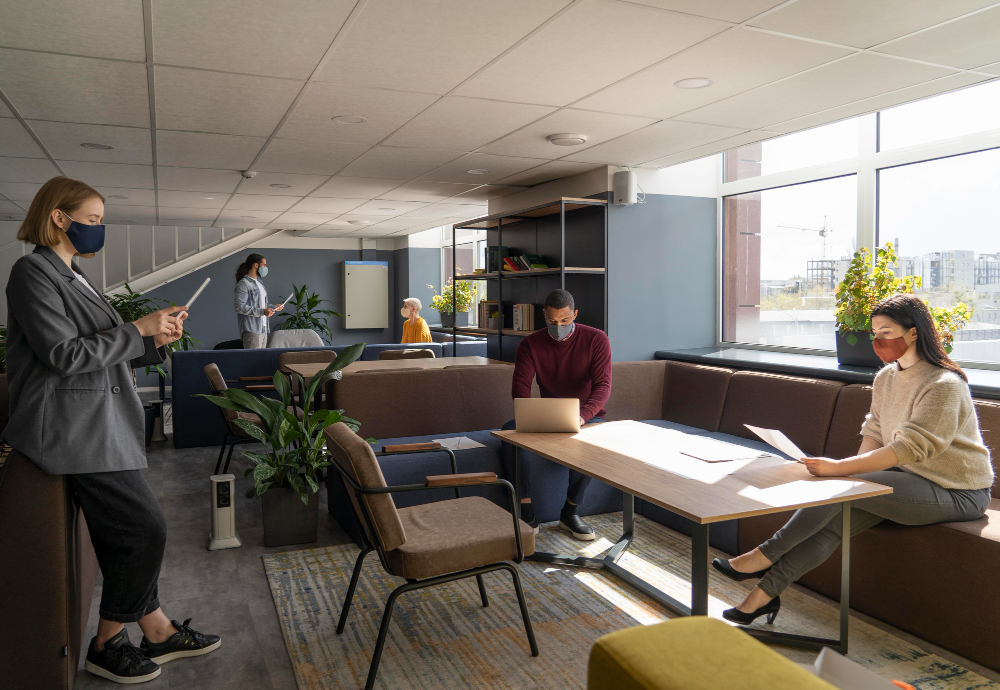Top Challenges of a Hybrid Workplace & How To Solve Them

The hybrid workplace model has become a key trend in the corporate world, blending the flexibility of remote work with the collaboration opportunities of office life. While this model offers plenty of benefits, such as improved work-life balance and reduced commuting times, it’s not without its challenges.
Successfully balancing in-office and remote work comes with hurdles that affect productivity, employee engagement, and even how office spaces are designed. This blog dives into the significant obstacles posed by hybrid workplaces and strategies to overcome them. Plus, if your office setup needs an upgrade to accommodate this model, we’ll show you how modular furniture in Orlando, FL could be the answer.
What is a Hybrid Workplace Model?
At its core, the hybrid workplace model allows employees to split their time between working remotely and working from the office. The specifics of the arrangement depend on the company. Some organizations might require a set number of office days, while others give employees full autonomy to decide.
The flexibility is designed to benefit both employees and employers, but maintaining consistency, productivity, and cohesion under this model isn’t always straightforward. Here's a closer look at the major challenges businesses are facing.
1. Communication Breakdowns
One of the biggest struggles of a hybrid workplace model involves communication. With employees spread across remote and in-office environments, vital information can easily get lost. Miscommunication or delayed responses can lead to reduced efficiency and collaboration gaps.
How to Address It:
- Leverage Technology: Use tools like Slack or Microsoft Teams for instant communication. For organized project management, platforms like Trello or Asana help ensure tasks and updates are visible to everyone.
- Establish Clear Communication Protocols: Set clear expectations about how and when teams should communicate, such as responding to messages within specific timelines or organizing regular team check-ins.
2. Creating an Inclusive Work Culture
A hybrid model can lead to disparities when remote employees feel left out of in-office activities or decision-making. For companies based in a city like Orlando, FL—with its vibrant business culture and sunny office spaces—inclusion can be an even bigger challenge when some employees miss out on team bonding happening in person.
How to Address It:
- Plan Hybrid-Friendly Events: Blend virtual and in-person participation in meetings, training, and social activities to keep everyone involved.
- Ask for Feedback: Regularly check in with employees, both in-office and remote, to understand how included they feel.
3. Office Space Utilization
With part of the team working remotely, traditional office layouts often become inefficient. Empty desks and meeting rooms can feel like wasted space, while collaborative areas may be too few for employees present in person. This is where modular furniture in Orlando, FL can make a difference.
How to Address It:
- Opt for Multi-Functional Furniture: Modular furniture like adjustable desks, movable walls, and convertible seating lets you adapt the office to match current needs.
- Plan for Flexibility: Create spaces that can transition between solo workstations and collaborative zones to ensure maximum office efficiency.
Companies across Orlando have been turning to flexible designs to reflect the fluidity of hybrid work. If you need help redesigning, 360 MFI specializes in creating adaptable office layouts using cutting-edge modular furniture.
4. Maintaining Productivity Across Locations
Another challenge for the hybrid workplace model is ensuring consistent productivity, regardless of location. Remote workers, home distractions, and tech issues can interfere with performance, while in-office staff might face their own interruptions.
How to Address It:
- Provide the Necessary Tools: Invest in technology like high-speed internet allowances for remote workers and ergonomic furniture in both home and office setups to ensure comfort and functionality.
- Set Clear Goals and Metrics: Implement clear KPIs (Key Performance Indicators) to measure employee performance objectively, regardless of where they work.
5. Employee Burnout
Many employees struggle to disengage from work in hybrid models. Remote employees may extend work hours due to blurred personal and professional boundaries, while in-office workers might face pressure to attend more meetings or manage tasks for remote colleagues.
How to Address It:
- Encourage Work-Life Boundaries: Encourage employees to set clear boundaries between work and home and to switch off after hours.
- Offer Wellness Support: Provide mental health resources or wellness initiatives that support your team with stress management strategies.
6. Technology Gaps
For hybrid teams to work efficiently, robust technology infrastructure is crucial. However, mismatched tools, outdated software, or a lack of proper equipment often hinder seamless operations.
How to Address It:
- Standardize Tools: Ensure everyone, whether at home or in the office, has access to the same platforms and tools to enable consistent collaboration.
- Upgrade Office Tech: Equip offices with hybrid-friendly technology like video conferencing setups, high-speed internet, and shared digital whiteboards.
Overcome the Challenges of Hybrid Work with the Right Solutions
The hybrid workplace model may be fraught with challenges, but each one has a solution rooted in thoughtful planning, smart tech choices, and adaptable office spaces. By addressing communication breakdowns, fostering a sense of inclusion, and optimizing your environment (with tools like modular furniture), businesses in Orlando, FL, and beyond, can truly thrive in this new era of work.
Are you ready to transform your hybrid office into a space that drives productivity and collaboration? Contact 360 MFI today to request a free quote on modular furniture in Orlando, FL, and take the first step toward a more flexible and efficient workplace.